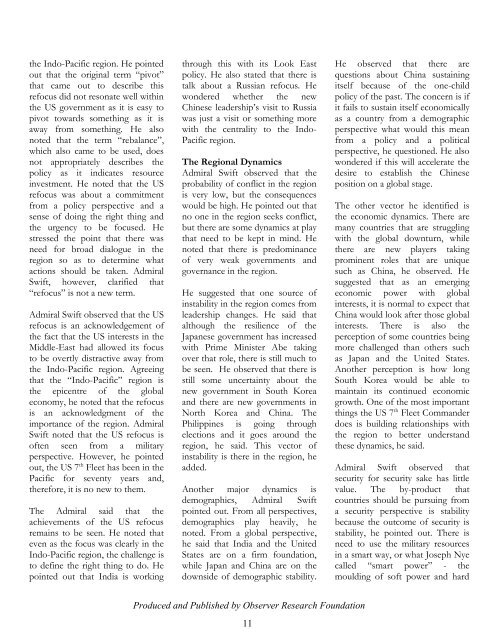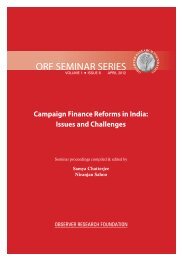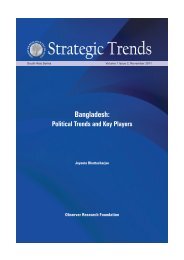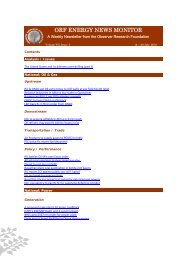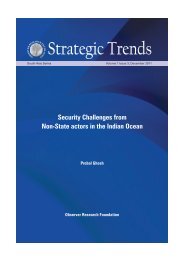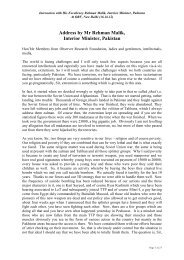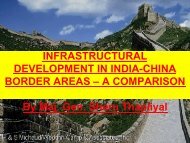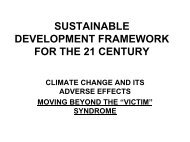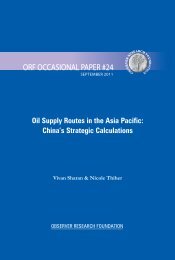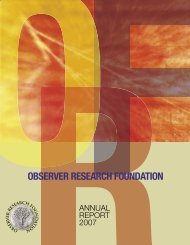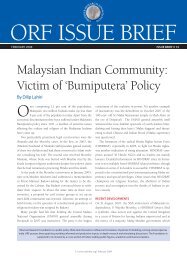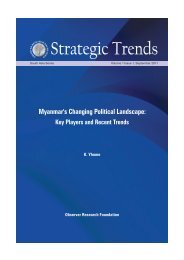Produced and Published by Observer Research Foundation 1 Vol. II ...
Produced and Published by Observer Research Foundation 1 Vol. II ...
Produced and Published by Observer Research Foundation 1 Vol. II ...
Create successful ePaper yourself
Turn your PDF publications into a flip-book with our unique Google optimized e-Paper software.
the Indo-Pacific region. He pointed<br />
out that the original term “pivot”<br />
that came out to describe this<br />
refocus did not resonate well within<br />
the US government as it is easy to<br />
pivot towards something as it is<br />
away from something. He also<br />
noted that the term “rebalance”,<br />
which also came to be used, does<br />
not appropriately describes the<br />
policy as it indicates resource<br />
investment. He noted that the US<br />
refocus was about a commitment<br />
from a policy perspective <strong>and</strong> a<br />
sense of doing the right thing <strong>and</strong><br />
the urgency to be focused. He<br />
stressed the point that there was<br />
need for broad dialogue in the<br />
region so as to determine what<br />
actions should be taken. Admiral<br />
Swift, however, clarified that<br />
“refocus” is not a new term.<br />
Admiral Swift observed that the US<br />
refocus is an acknowledgement of<br />
the fact that the US interests in the<br />
Middle-East had allowed its focus<br />
to be overtly distractive away from<br />
the Indo-Pacific region. Agreeing<br />
that the “Indo-Pacific” region is<br />
the epicentre of the global<br />
economy, he noted that the refocus<br />
is an acknowledgment of the<br />
importance of the region. Admiral<br />
Swift noted that the US refocus is<br />
often seen from a military<br />
perspective. However, he pointed<br />
out, the US 7 th Fleet has been in the<br />
Pacific for seventy years <strong>and</strong>,<br />
therefore, it is no new to them.<br />
The Admiral said that the<br />
achievements of the US refocus<br />
remains to be seen. He noted that<br />
even as the focus was clearly in the<br />
Indo-Pacific region, the challenge is<br />
to define the right thing to do. He<br />
pointed out that India is working<br />
through this with its Look East<br />
policy. He also stated that there is<br />
talk about a Russian refocus. He<br />
wondered whether the new<br />
Chinese leadership’s visit to Russia<br />
was just a visit or something more<br />
with the centrality to the Indo-<br />
Pacific region.<br />
The Regional Dynamics<br />
Admiral Swift observed that the<br />
probability of conflict in the region<br />
is very low, but the consequences<br />
would be high. He pointed out that<br />
no one in the region seeks conflict,<br />
but there are some dynamics at play<br />
that need to be kept in mind. He<br />
noted that there is predominance<br />
of very weak governments <strong>and</strong><br />
governance in the region.<br />
He suggested that one source of<br />
instability in the region comes from<br />
leadership changes. He said that<br />
although the resilience of the<br />
Japanese government has increased<br />
with Prime Minister Abe taking<br />
over that role, there is still much to<br />
be seen. He observed that there is<br />
still some uncertainty about the<br />
new government in South Korea<br />
<strong>and</strong> there are new governments in<br />
North Korea <strong>and</strong> China. The<br />
Philippines is going through<br />
elections <strong>and</strong> it goes around the<br />
region, he said. This vector of<br />
instability is there in the region, he<br />
added.<br />
Another major dynamics is<br />
demographics, Admiral Swift<br />
pointed out. From all perspectives,<br />
demographics play heavily, he<br />
noted. From a global perspective,<br />
he said that India <strong>and</strong> the United<br />
States are on a firm foundation,<br />
while Japan <strong>and</strong> China are on the<br />
downside of demographic stability.<br />
He observed that there are<br />
questions about China sustaining<br />
itself because of the one-child<br />
policy of the past. The concern is if<br />
it fails to sustain itself economically<br />
as a country from a demographic<br />
perspective what would this mean<br />
from a policy <strong>and</strong> a political<br />
perspective, he questioned. He also<br />
wondered if this will accelerate the<br />
desire to establish the Chinese<br />
position on a global stage.<br />
The other vector he identified is<br />
the economic dynamics. There are<br />
many countries that are struggling<br />
with the global downturn, while<br />
there are new players taking<br />
prominent roles that are unique<br />
such as China, he observed. He<br />
suggested that as an emerging<br />
economic power with global<br />
interests, it is normal to expect that<br />
China would look after those global<br />
interests. There is also the<br />
perception of some countries being<br />
more challenged than others such<br />
as Japan <strong>and</strong> the United States.<br />
Another perception is how long<br />
South Korea would be able to<br />
maintain its continued economic<br />
growth. One of the most important<br />
things the US 7 th Fleet Comm<strong>and</strong>er<br />
does is building relationships with<br />
the region to better underst<strong>and</strong><br />
these dynamics, he said.<br />
Admiral Swift observed that<br />
security for security sake has little<br />
value. The <strong>by</strong>-product that<br />
countries should be pursuing from<br />
a security perspective is stability<br />
because the outcome of security is<br />
stability, he pointed out. There is<br />
need to use the military resources<br />
in a smart way, or what Joseph Nye<br />
called “smart power” - the<br />
moulding of soft power <strong>and</strong> hard<br />
<strong>Produced</strong> <strong>and</strong> <strong>Published</strong> <strong>by</strong> <strong>Observer</strong> <strong>Research</strong> <strong>Foundation</strong><br />
11


